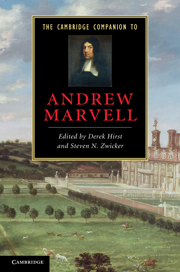Book contents
- Frontmatter
- 1 Introduction
- 2 The social modes of Marvell’s poetry
- 3 Marvell and the literary past
- 4 Borders and transitions in Marvell’s poetry
- 5 Thinking of gender
- 6 Marvell and the designs of art
- 7 Andrew Marvell’s citizenship
- 8 The green Marvell
- 9 A Cromwellian centre?
- 10 The poet’s religion
- 11 Adversarial Marvell
- 12 How to make a biography of Andrew Marvell
- Index
- Cambridge Companions to. . .
7 - Andrew Marvell’s citizenship
Published online by Cambridge University Press: 28 March 2011
- Frontmatter
- 1 Introduction
- 2 The social modes of Marvell’s poetry
- 3 Marvell and the literary past
- 4 Borders and transitions in Marvell’s poetry
- 5 Thinking of gender
- 6 Marvell and the designs of art
- 7 Andrew Marvell’s citizenship
- 8 The green Marvell
- 9 A Cromwellian centre?
- 10 The poet’s religion
- 11 Adversarial Marvell
- 12 How to make a biography of Andrew Marvell
- Index
- Cambridge Companions to. . .
Summary
‘This day £36 13s 4d is taken out of the iron chest and paid unto Mr Edmond Popple for the use of his brother Andrew Marvell Esquire given him by this board for his service in the last session.’ So was recorded in the minute book of the Common Council (or ‘Bench’ or ‘Board’, as it was also wont to style itself) of Kingston-upon-Hull on 3 December 1663. It is an everyday and unremarkable moment of civic business that nevertheless encapsulates many of the themes of this essay. This is true in terms of both what it reveals about Andrew Marvell’s citizenship and also what, on closer viewing, it leaves unsaid. Most obviously, it hints at the prominent part that Marvell’s urban background, education and identity played in his civic persona: a provincial urbanity that was constitutive of – rather than an alternative to – his metropolitan and national political consciousness, but which has been largely neglected, or at least underplayed, by critics and historians. Second, it indicates the importance of family and friendship in structuring Marvell’s civic associations and responsibilities. Edmond Popple was at once Marvell’s brother-in-law and a prominent burgess of Kingston-upon-Hull who sponsored his ‘brother’ to be made a freeman of Hull in 1658 (a prerequisite of standing for parliamentary election) and who acted as his financial broker with the Board thereafter. A similar conflation of familial and political affiliation can be found in many other of Marvell’s most important civic associations.
- Type
- Chapter
- Information
- The Cambridge Companion to Andrew Marvell , pp. 102 - 121Publisher: Cambridge University PressPrint publication year: 2010
- 1
- Cited by

